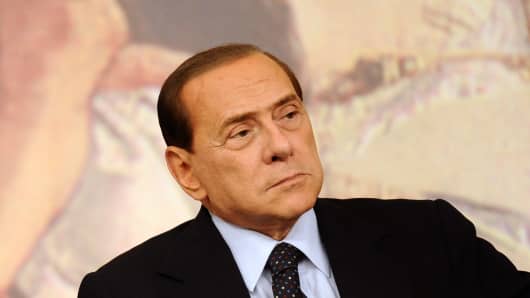The German government has warned Silvio Berlusconi not to target Berlin in the run-up to elections early next year after the former Italian prime minister attacked the "German-centric" economic policies of his successor Mario Monti.
Mr Berlusconi, preparing for his sixth election battle since 1994, demonstrated on Tuesday that his campaign would not hesitate to take on Mr Monti's reform legacy while whipping up populist sentiments against Germany's perceived domination of the euro zone.
"The Monti government has followed the German-centric policies which Europe has tried to impose on other states, and it has created a crisis situation that is much worse than when we were in government," Mr Berlusconi said in a phone-in to a breakfast show on Canale 5, one of his own television channels.
He also attacked the spread between Italian and German bonds as a "trick" and an "invention" used by Germany to bring down his elected government 13 months ago while unfairly raising the borrowing costs of Italy, its industrial rival.
Clearly irritated, Berlin was quick to respond. Guido Westerwelle, foreign minister, said the government would not interfere inItaly's elections, adding: "But one thing we will not accept – that Germany should be made the target of a populist election campaign. Neither Germany nor Europe are the cause of the current difficulties in Italy."
Chancellor Angela Merkel said."The Italian people will make their choice. I support what the government of Mario Monti has done inintroducing reforms." She added that investors had shown growing trust in Italy as a result. "So the Italian people will no doubt make their choice to ensure that Italy continues on the right track."
Italy is expected to go to the polls in February after Mr Monti made known at the weekend that he would resign early having lost the support of Mr Berlusconi's center-right People of Liberty in parliament.
Mr Berlusconi's campaign themes mirror those successfully exploited in recent months by the anti-establishment Five Star Movement, which has overtaken the People of Liberty in some polls but is still well behind the center-left Democrats.
A Financial Times/Harris poll of five European countries shows that Italian attitudes against Germany and austerity are hardening, with 83 percent saying Germany's influence in the EU is "too strong," up from 53 percent in October 2011. In addition, 74 percent of Italians feel that Germany is showing "not enough" solidarity with the rest of the euro zone.
Commentators in Rome said Mr Berlusconi's tack revealed his fear that Mr Monti, an appointed technocrat, would decide to run for office. Mr Monti has not showed his hand, but if he did enter the fray then the election could evolve into a referendum on his reforms and, by extension, Italy's future in the euro zone.
Interviewed on state television, Mr Monti made a robust defense of his economic policies and, in a thinly veiled reference to Mr Berlusconi, warned voters against believing in "magic solutions" from politicians who risked "creating fractures with Europe."


